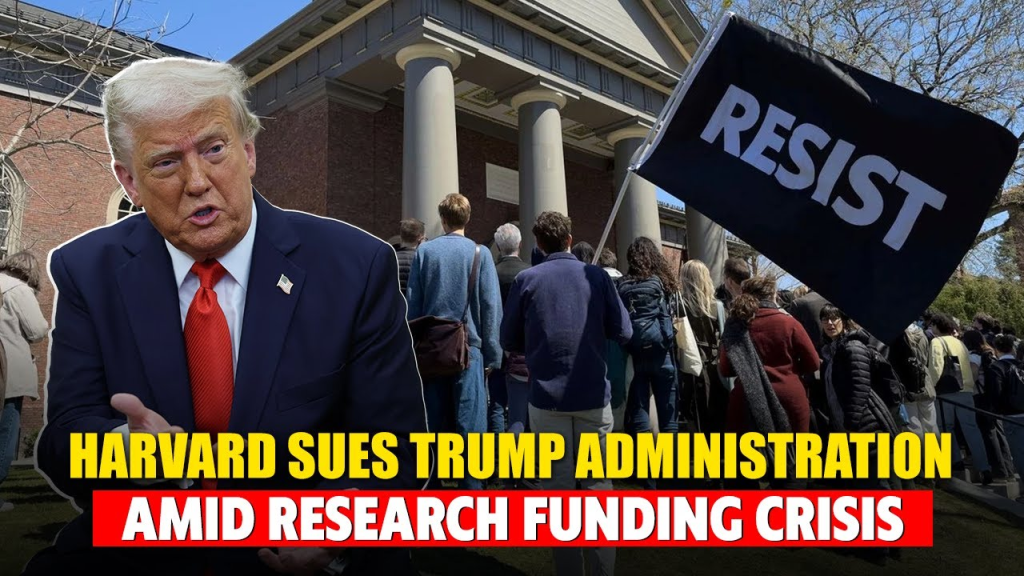
The Harvard research funding crisis has sent shockwaves through the academic community, as funding for critical projects becomes increasingly jeopardized. Following the Trump administration’s controversial demands, Harvard faced an immediate halt on contracts exceeding $19 million, including groundbreaking organ-on-a-chip studies led by Don Ingber at the Wyss Institute. This monkey wrench in operations not only hinders innovative research but also threatens to destabilize the future of American innovation, which relies heavily on robust university-led scientific exploration. Ingber, along with many other researchers, finds themselves navigating a state of uncertainty as they strive to maintain their teams and projects against this sudden financial upheaval. As Harvard fights to reinstate these vital funding streams, the broader implications for the landscape of research in the United States remain profoundly concerning, reflecting a pivotal moment in academia’s relationship with governmental support.
The ongoing funding emergency at Harvard University highlights a critical juncture for academic research, especially surrounding essential projects like those utilizing organ-on-a-chip technology. With the abrupt suspension of research funding after regulatory conflicts with the government, the ripple effects impact not only Harvard’s faculty but also the entire landscape of American scientific advancements. Don Ingber, a prominent figure in this research narrative, is facing unprecedented challenges as he works diligently to safeguard his teams and their innovative pursuits. This crisis raises alarms about the stability of research funding mechanisms and their role in fostering technological progress within the nation. As the situation unfolds, it poses significant questions regarding the future of scholarly collaboration and the protective measures necessary for sustaining groundbreaking innovations.
The Impact of the Harvard Research Funding Crisis on Innovation
The recent funding crisis at Harvard University has raised alarms about the potential consequences for research innovation, particularly in the realm of scientific advancement. Under the stewardship of Don Ingber, the Wyss Institute has been a beacon of American innovation, developing groundbreaking technology such as organ-on-a-chip systems. However, the abrupt freezing of approximately $2.2 billion in research funding has paralyzed projects that are critical to understanding and addressing health issues and technological challenges. The stark realization that such valuable research could be halted prompts us to consider the broader implications on the future of American innovation.
As Ingber pointed out, the projects affected by the funding crisis aim to tackle urgent health concerns, such as radiation exposure and its impact on human health. The organ-on-a-chip technology developed at the Wyss Institute models these effects, making it a vital tool for advancements in medical treatments and drug testing. If funding is not restored, not only will this impede progress within Harvard, but it could also create a ripple effect throughout the entire research community. The crumbling foundation of research funding threatens to weaken the innovation engine that has propelled the American economy for decades.
Don Ingber: Navigating Uncertainty in Research Funding
Don Ingber, a prominent figure in biological engineering, finds himself managing a crisis that stems from political controversy and its impact on collaborative research endeavors. The stop-work order he received was unexpected and placed immense pressure on his team, filled with talented researchers and eager students. Ingber’s commitment to safeguarding his personnel amidst this tumultuous landscape reflects a deep sense of responsibility, emphasizing the human element in scientific progress. As he navigates funding cuts and potential project cancellations, the urgency to stabilize his team and maintain their faith in the scientific process becomes paramount.
Ingber’s efforts extend beyond immediate crisis management; he actively seeks alternative funding sources and opportunities for his team. This proactive approach not only highlights his leadership qualities but also illustrates the challenging environment faced by researchers in navigating the complex intersection of politics and academia. His focus on protecting projects that promise to drive innovations, particularly in areas that align with national interest—such as space exploration and public health—underscores the essence of collaborative efforts between academia and the government. This cooperation has historically been a cornerstone of progress, and it is critical that it continues to thrive.
Future of Research at Harvard and Its Global Implications
The current funding crisis at Harvard serves as a cautionary tale reflecting broader global implications for research and innovation. As institutions like Harvard University lead in scientific breakthroughs that shape technology and health, the uncertainty surrounding funding allocations raises questions for the entire ecosystem. If prestigious universities begin to lose their appeal due to internal governance conflicts and external funding challenges, the flow of talent and ideas could diminish significantly, impacting American innovation and its worldwide influence.
The competitive landscape for attracting international talent is vital for maintaining a robust research community. Researchers from around the globe have historically viewed institutions like Harvard as ideal locations to foster their careers. The doubts and fears ignited by these recent developments threaten America’s status as a premier destination for intellectual exchange. If scientists perceive instability and risk in their potential roles in the U.S., they may seek opportunities elsewhere, creating a vacuum in innovation that could take years to fill. The future of research at Harvard and similar institutions must be preserved to continue driving advancements and addressing complex global problems.
Maintaining Momentum in the Face of Funding Challenges
In light of the recent funding crises, it is critical that funding bodies and government entities recognize the importance of research in driving innovation. As Ingber noted, the collaborative relationship between please the government and academia has been a mainstay of progress, suggesting that this partnership must be fortified to navigate these tumultuous times. The preservation of projects that utilize organ-on-a-chip technologies, for instance, is more than just an academic pursuit; it represents the speeds of American ingenuity aimed at solving pressing health and aerospace challenges.
To maintain momentum, it becomes essential for researchers to adapt strategies that secure alternative funding while continuing to pursue groundbreaking projects. As Ingber leads efforts to safeguard his team, the approach must also involve engaging stakeholders, including private sector partners who align with the vision of innovative research driven by public good. Fostering transparency, showcasing the value of lifesaving technologies, and emphasizing the implications of research on everyday life can further bridge the gap between academia and potential funders.
The Role of Organ-on-a-Chip Technology in Scientific Advancement
Organ-on-a-chip technology represents a significant leap forward in medical research and testing methodologies. By utilizing this innovative technology, scientists can model human organ systems in a controlled environment, providing invaluable insights into how diseases affect the body, including chronic health issues exacerbated by environmental factors. The ongoing projects led by Ingber at Harvard exemplify the transformative power of organ-on-a-chip devices, which are not only crucial for developing new drugs but are also instrumental in enhancing our understanding of complex biological interactions.
Particularly relevant is the potential role of this technology in mitigating the health risks associated with radiation exposure, an increasing concern as nuclear technology becomes more prevalent in supporting aspirations like space travel and artificial intelligence. Ingber’s research using organ-on-a-chip systems to study both the acute and gradual effects of radiation on organs aims to develop comprehensive solutions that could save lives and enhance human safety. As funding becomes precarious, safeguarding these projects is essential for investing in health advancements that benefit both the scientific community and society as a whole.
Responding to the Uncertainty: Future Directions
The landscape of research funding in America is undeniably shifting, and scientists like Don Ingber are responding by focusing on adaptability and resilience. Facing the uncertainties of an evolving political context, researchers must employ strategies that ensure the continuity of their work and safeguard the well-being of their teams. This crisis forces academies and research institutes to rethink their funding structures and seek more sustainable partnerships that connect them with private sectors, philanthropic foundations, and international organizations.
Engagement is crucial in these efforts; it involves communicating the critical needs and contributions of scientific research in a way that resonates with potential funders. To reestablish the stability of American research, Ingber’s proactive measures could serve as a framework for others in academia, creating models that emphasize innovation potential, interdisciplinary collaboration, and the enhancement of public well-being through science. As researchers navigate this uncertain terrain, their determination to uplift both projects and people might pave the way for a renewed era of scientific exploration and excellence.
The Importance of International Collaboration in Research
In a rapidly changing world, fostering international collaboration has become more crucial than ever for advancing scientific research and innovation. The interconnected nature of global challenges, from health pandemics to climate change, emphasizes that no single country can tackle these issues in isolation. Harvard University, with its diverse research landscape, has been at the forefront of building such collaborative frameworks, but recent funding crises have dimmed their welcoming beacon for international talent.
At the heart of Ingber’s initiatives lies a commitment to restoring the collaborative spirit that has historically enriched scientific research. Engaging experts from different countries, forging partnerships with global institutions, and nurturing networks of researchers can invigorate America’s research community. By reaffirming their commitment to inclusivity and partnership, Harvard and similar institutions can mitigate the risks of withdrawal from global collaboration, ensuring that the next generation of scientific leaders can continue to emerge, regardless of geopolitical tensions.
Navigating the Legal Landscape of Research Funding
Amidst the turmoil caused by the halt on research funding, the legal battles being waged by Harvard University illustrate the complexities surrounding academia’s relationship with federal governing bodies. The ongoing lawsuit against the Trump administration demonstrates a commitment to contesting actions viewed as unconstitutional overreaches, serving as a case study for other institutions facing similar dilemmas. Ingber’s involvement in these legal discussions speaks to the broader implications for research funding, as securing financial resources becomes intertwined with legal strategy.
Understanding the legal ramifications of funding cuts and disputes is essential for navigating the future landscape of research. Institutions must ensure that they are equipped with legal frameworks that protect their interests and the advancement of knowledge. Ingber’s proactive approach, actively engaging with media and policymakers, showcases an urgent need for academia to advocate for its position. As lawsuits unfold, the outcomes will not only determine the immediate fates of individual projects but could also reshuffle the guidelines that govern research funding nationally, dictating how collaborations between government and academia will evolve.
Frequently Asked Questions
What is the Harvard research funding crisis about?
The Harvard research funding crisis refers to the recent halt of approximately $2.2 billion in federal research funding to Harvard University. This suspension was imposed after Harvard refused to meet certain administration demands related to governance, hiring practices, and audits. The hold affected many vital projects, including those led by Don Ingber at the Wyss Institute, threatening to disrupt significant advancements in fields like biomedical engineering.
How is Don Ingber impacted by the Harvard research funding crisis?
Don Ingber, the founding director of the Wyss Institute for Biologically Inspired Engineering at Harvard, was directly impacted by the research funding crisis when he received a stop-work order on two of his organ-on-a-chip projects. These projects were crucial for understanding radiation damage and their cessation puts at risk significant scientific advancements and collaborations within his team.
What are the implications of the Harvard research funding crisis on American innovation?
The implications of the Harvard research funding crisis on American innovation are profound. As expressed by Don Ingber, the halt in funding threatens the foundational relationship between academia and government that has historically driven technological advancements. This disruption may lead to a decrease in the U.S.’s ability to foster scientific research, which is essential for sustaining innovation in various high-impact sectors, including healthcare and space exploration.
What role do organ-on-a-chip projects play in the context of the Harvard research funding crisis?
Organ-on-a-chip projects led by researchers like Don Ingber are vital for advancing medical research. During the Harvard research funding crisis, these projects, which study radiation effects on human organs and model spaceflight impacts on astronauts, are at risk of significant interruption. Their success is crucial not only for understanding human health but also for preparing for future challenges like increased nuclear power production and long-duration space missions.
How does the Harvard research funding crisis affect talent retention in academia?
The Harvard research funding crisis is creating significant uncertainty around job stability for researchers, which jeopardizes talent retention at institutions like Harvard. Don Ingber reported that anxiety over the funding cuts has led to scientists reconsidering career opportunities, impacting the ability to attract and retain top talent crucial for ongoing and future research initiatives.
What are potential solutions to address the Harvard research funding crisis?
Potential solutions to the Harvard research funding crisis include legal actions like Harvard’s lawsuit to restore funding and public advocacy emphasizing the importance of academic research for national innovation. Additionally, shifting internal funds to support ongoing projects and finding alternative funding sources could provide short-term relief for affected researchers and projects.
What message is Don Ingber trying to convey during the Harvard research funding crisis?
During the Harvard research funding crisis, Don Ingber is advocating for the recognition of academic research as fundamental to the American innovation economy. His message is that collaboration between government and academia has historically driven progress and that the current funding crisis threatens this vital partnership, with potential long-term negative impacts on science and technology advances.
What impact could the Harvard research funding crisis have on future research projects?
The Harvard research funding crisis could have a detrimental impact on future research projects by causing delays, compromising ongoing experiments, and potentially leading to the abandonment of promising initiatives. This risk is particularly acute for projects like Ingber’s organ-on-a-chip studies, which are critical for understanding complex biological problems and developing new solutions.
How vital are the collaborations between Harvard and the government in the context of the funding crisis?
Collaborations between Harvard and the government are essential for funding groundbreaking research that advances innovation and technology in the U.S. Within the context of the funding crisis, these collaborations face significant jeopardy, which could undermine future scientific advancements by disrupting the funding pipeline that supports critical research at institutions like Harvard.
| Key Development | Details |
|---|---|
| Stop-Work Order Issued | Harvard received a stop-work order affecting $19 million in research grants after rejecting demands from the Trump administration. |
| Federal Funding Frozen | Approximately $2.2 billion in research funding to Harvard was frozen, sparking a lawsuit over governance and admissions changes demanded by the government. |
| Impact on Researchers | Researchers at Harvard, including Don Ingber, are scrambling to find solutions for affected projects and ensure job security for staff and students. |
| Ongoing Research Importance | Key projects involve critical studies on radiation damage in humans and effects on astronauts, necessary for future space travel and medical applications. |
| Concerns for Foreign Scientists | The uncertainty surrounding the funding crisis is causing foreign scientists to reconsider opportunities in the U.S., affecting recruitment. |
| Long-Term Economic Implications | Ingber highlights the importance of academic research in driving America’s innovation economy, which is at risk due to the current crisis. |
Summary
The Harvard research funding crisis is a critical issue that threatens the future of academic research and innovation in the United States. Following a stop-work order from the Trump administration, Harvard faced the freezing of $2.2 billion in research funds, impacting vital projects and the careers of researchers and students. This situation not only jeopardizes ongoing scientific endeavors but also dissuades international talent from pursuing opportunities in America, undermining the country’s longstanding position as a leader in innovation. Without the collaboration between government and academia that has driven progress for decades, the stability of America’s research landscape is in jeopardy.


